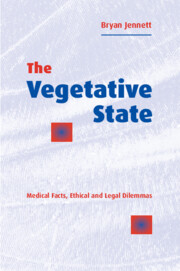Book contents
- Frontmatter
- Contents
- Foreword
- Preface
- Acknowledgements
- An appeal to doctors
- Traumatic decortication
- List of abbreviations
- 1 A syndrome in search of a name
- 2 Diagnosis
- 3 Epidemiology
- 4 Pathology of the brain damage
- 5 Prognosis for recovery and survival
- 6 Attitudes to the permanent vegetative state
- 7 Medical management
- 8 Ethical issues
- 9 Legal issues in the United States
- 10 Legal issues in Britain
- 11 Legal issues in other countries
- 12 Details of some landmark cases
- Epilogue
- Index
9 - Legal issues in the United States
Published online by Cambridge University Press: 21 December 2009
- Frontmatter
- Contents
- Foreword
- Preface
- Acknowledgements
- An appeal to doctors
- Traumatic decortication
- List of abbreviations
- 1 A syndrome in search of a name
- 2 Diagnosis
- 3 Epidemiology
- 4 Pathology of the brain damage
- 5 Prognosis for recovery and survival
- 6 Attitudes to the permanent vegetative state
- 7 Medical management
- 8 Ethical issues
- 9 Legal issues in the United States
- 10 Legal issues in Britain
- 11 Legal issues in other countries
- 12 Details of some landmark cases
- Epilogue
- Index
Summary
The law came late on the scene of medical decision making about patients who were considered to be hopelessly ill and unable to benefit from further medical intervention. However, with the Quinlan case in 1976 it came much sooner in the US than in England, where the first vegetative case (Bland) did not come until 16 years later. The legal arguments raised by withdrawing treatment from vegetative patients had therefore been exhaustively rehearsed in courts and commentaries in the US before other jurisdictions faced this problem. Inevitably, therefore, the American experience influenced how others later approached this issue.
The New Jersey court broke new legal ground in 1976 when it ruled that withdrawing life-sustaining treatment from Karen Quinlan, who was vegetative, was a matter to be decided by her family in consultation with her physicians (1). The court acknowledged that it had already become accepted good medical practice to limit life-prolonging treatment in terminal cases when there seemed to be a conflict between two duties of a physician – to prolong life and to prevent suffering (p. 187). However, the court pointed out that, so far, this had been happening without the sanction of civil law. The importance of involving the law was to give the approval of society to this medical practice and to suggest due process for physicians and families in these sensitive situations.
- Type
- Chapter
- Information
- The Vegetative StateMedical Facts, Ethical and Legal Dilemmas, pp. 127 - 146Publisher: Cambridge University PressPrint publication year: 2002
- 1
- Cited by



